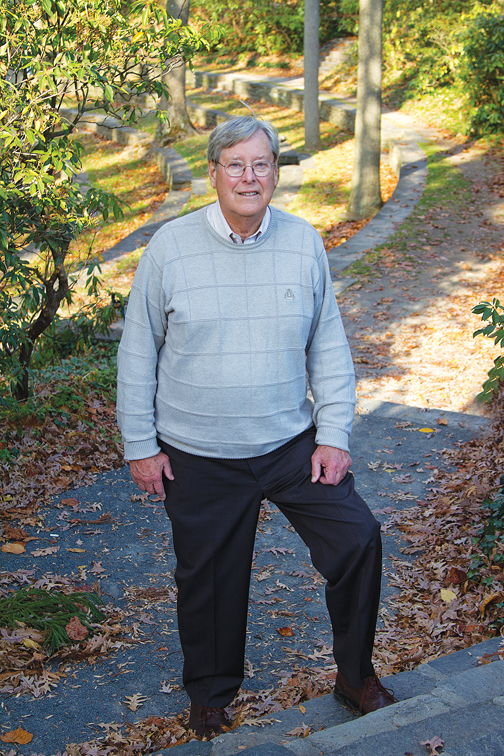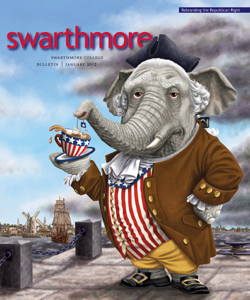Why is Bob Barr so deeply affected?

Former Dean of Men and Dean Emeritus of Admissions Bob Barr ’56 has been honored by an endowed scholarship in his name.
I sat down with Bob Barr ’56 in November at the small but comfortable cottage at Foulkeways at Gwynedd—a retirement community north of Philadelphia—that he shares with his wife, Nony Moore Barr. Bob, whom I have known for two decades, has always looked younger than his years. At 77, he still exhibits the open, boyish air that has always made it easy for him to connect with young people. Then again, when he returned to Swarthmore a year after graduation to work with Gilmore Stott in the newly formed Admissions Office, he was, at 23, barely an adult.
Barr, who majored in political science, later served Swarthmore as dean of men from 1962 to 1970. He remembers President Courtney Smith telling him, “Bob, I’m just giving you the job of holding the student community together. We’re in for some difficult years.”
Following Smith’s death in office in early 1969, Barr seriously considered being a college president himself. He explored this idea during three years as assistant to the president of Chatham College in Pittsburgh, eventually deciding that he “didn’t want to be a president, even if someone wanted me to be. There were just too many constituencies to please—too much emphasis on development. I missed the contact that I’d always had with students.”
In 1977, after a stint as dean of students at Dickinson College, Barr returned to Swarthmore, this time to stay. “The admissions operation had fallen on difficult times,” he says. “We had to expand our travel to secondary schools, upgrade our publications, and improve the morale of the staff, which needed more contact with the faculty and the rest of the community. I was in a good position to build those bridges.”
Barr served as dean of admissions until 1994, when he moved to a position in development. He retired in 1996—“one of the most difficult decisions I ever made,” he says. “But the morning after it was accomplished, I wondered why in heaven’s name I hadn’t done it 10 years earlier.”
In retirement, Barr remains busy. For about a decade before moving to Foulkeways, he and Nony lived on Cape Cod and in Swarthmore. They travel and work on various volunteer causes. He is on the boards of both Germantown Friends School and Foulkeways, and they spend as much time as possible with their two sons and four grandchildren.
Recently, three alumni spearheaded an effort to raise more than $100,000 to endow a new Robert A. Barr Jr. Scholarship. Jeffrey Krieger ’86, Steven Sell ’89, and Vivek Varma ’88 described the scholarship as “a fitting way to honor a man who gave much of his life to Swarthmore.”
Although fundraising continues in order to increase the size of the award, the scholarship was announced in October and will be awarded for the first time this month to a student “with strong academic credentials who also shows promise of making substantial contributions to the co-curricular life of the campus.” For its many donors—including members of the Barr family—the scholarship makes manifest what’s been the singular focus of Bob Barr’s life: helping young people achieve their highest potential.
Who were your mentors at Swarthmore?
[Richter Professor Emeritus of Political Science] Roland Pennock [’27] was stern, but once he thought he saw something worth encouraging in a student, he was indefatigable. In fact, sometimes his standard for me wore me out.
I never played tennis more than just recreationally, but I got to know [tennis coach] Ed Faulkner, and we spent a lot of time together. What I learned from Ed was patience—that things worth working for seldom come quickly or easily.
And [President] Courtney Smith, a mentor and friend for many years, got me started in college administration, supported and encouraged me every day, and challenged me to reach farther and higher than, at times, I thought was possible. I don’t know what my life would have been like without his influence, but I can’t believe it would have been as satisfying and—I hope—useful.
What have you wanted to excel at in your life?
Helping people grow out of whatever limitations they were facing.
What quality do you have that helps you be successful at this—at least sometimes?
Successful sometimes, you’re right. I’m a good listener. I’m not judgmental. But also, I’m pretty good at knowing when to move from passive to active.
What do you mean by that?
Listening and gathering information is the passive side of counseling someone, but once you’ve defined the problems, you need to figure out strategies and tactics to overcome them. I’m pretty good at finding the right moment to ask, ‘What have we learned, and what are we going to do about it?’”
Do you remember your Swarthmore admissions interview?
I interviewed with Gil Stott the summer before my senior year in high school. I guess he thought it had gone well, because he took me in to meet [Dean] Everett Hunt.
In those days, your parents would accompany you, and my father—who was a great salesman and pretty self-confident—went in with me. Everett asked me half a dozen questions, most of which my father answered before I could open my mouth.
Finally, Everett turned to him and said, “Can we now let the young man answer some questions for himself?” And I thought, “This is where I’m going. He’s the first person who ever stood up to my father that way.”
How did college admissions change from the 1970s to the 1990s?
When I first started, students would apply to three or four colleges. Secondary schools didn’t put so much emphasis on college guidance and researching choices. It was much more anecdotal—kids would show up for an interview because an uncle had mentioned Swarthmore over Thanksgiving dinner. The process was not irrelevant, but it was pretty easy to get through it.
It became much more competitive—with more choices and more pressure. One of these pressures is the notion that “there must be one college out there that’s the right match for me.” A lot of my job was saying: “That’s bull. There are any number of colleges that would fit your needs and interests.”
Assuming comparable academic qualifications, is it fair to give preference to certain students on the basis of athletic ability?
I think it’s fair to give preference to kids whose interests and accomplishments—such as music, athletics, community service, or leadership in student government—would enrich our community.
Speaking of preferences, the new Barr Scholarship states that “when appropriate, preference will be given to sons and daughters of alumni.”
I think this is an honorable thing because such legacies are about our future, about having a core of interested and committed Swarthmore people among us—and about the importance of the past.
Fill in the blank: “For students, the college admissions process is …
… daunting. Mysterious. Painful.”
“To me, Swarthmore College is …
… a magical place.”
“I wish I had been able to …
… spend more time with my family. I don’t want my kids to read this and think they were gypped. I hope this is something I feel, not something they feel, but it was a career that took almost every minute. Or would have, had I let it.”
Do you have a guilty pleasure?
Right now, it has to do with the scholarship. It’s involved me so much emotionally—summing up so much of what I tried to do in my personal and professional life—that I feel a little guilty about it. I’m worried that people might say, “That Barr, he must have an enormous ego.” And, you know, there may be some truth to that. The recognition feels terrific, and I’m deeply affected by it.
 Email This Page
Email This Page